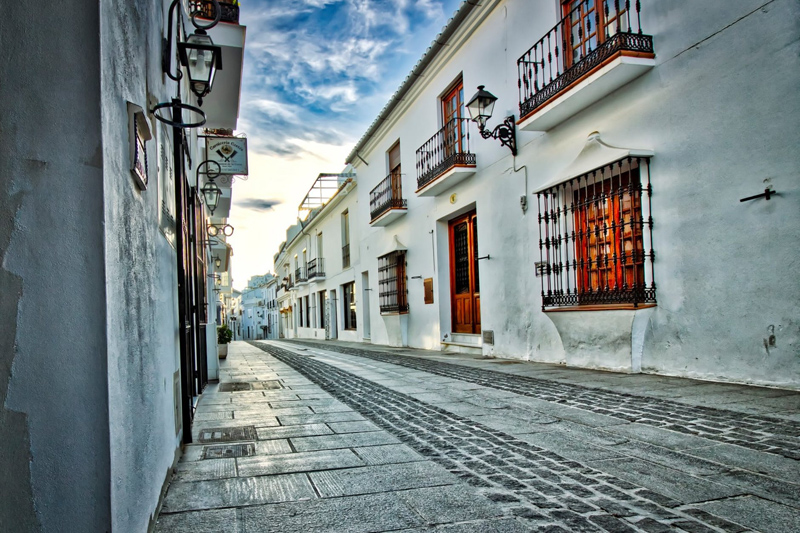Femenine substantives with masculine articles?

Few days ago, my husband and I, we were watching TV and heard someone on a film saying 'esta arma'. 'Esta arma?' my husband asked. If we say 'el agua', we should also say 'este arma'! But, as you can read below, this is not correct.
I am a native Spanish speaker, but I had to go to the Real Academia de la Lengua site. Why do we say "el arma" (masculine definite article + femenine noun), but we heard "esta arma" (feminine demonstrative + feminine noun)? Same thing happens with words like "agua" or "alma".
So, here is the answer:
According to the explanation by the Real Academia de la Lengua (in Spanish), feminine words starting with a tonic "a" must use the definite article in masculine form (el).
(A tonic syllable is the syllable pronounced with more strength in a word; so, for 'agua', the tonic syllable is that first syllable "a-")
For example: 'el agua', 'el alma', 'el arma'.
But take into account adjectives will always be used in femenine form:
'el agua limpia', 'el alma pura', 'el arma peligrosa', where 'limpia', 'pura' and 'peligrosa' are feminine adjectives.
About the indefinite article , although both forms, 'un' and 'una' are correct, it is better to use the masculine form, 'un': 'Han encontrado un agua muy limpia' (They have found a very clean water).
Same thing happens with 'algún' and 'ningún'. This forms are better than 'alguna' and 'ninguna'.
But remember, the rest of determinative adjectives must be used in femenine form: 'esta agua', 'esa agua', 'aquella agua' are correct forms.
(And this is the explanation to the form 'esta arma" we heard while watching a film!)
As a final note, the Real Academia de la Lengua says we have to use feminine forms with diminutives: 'esta armita' ('this small gun') because the accent is not placed on the fist syllable (ar-, in this example, or a- in 'esta agüita').
Here is a list of words that follow these rules:
el agua (the water)
el alma (the soul)
el arma (the gun, weapon)
el ansia (the anxiety)
el anca (the frog's leg)
el ascua (the ember)
el ama (the nanny or the housekeeper).
Recommended material:
Learn Spanish with SpanishPod.com
Learn Spanish with free lessons, vibrant community, web review, vocab study & more.
I am a native Spanish speaker, but I had to go to the Real Academia de la Lengua site. Why do we say "el arma" (masculine definite article + femenine noun), but we heard "esta arma" (feminine demonstrative + feminine noun)? Same thing happens with words like "agua" or "alma".
So, here is the answer:
According to the explanation by the Real Academia de la Lengua (in Spanish), feminine words starting with a tonic "a" must use the definite article in masculine form (el).
(A tonic syllable is the syllable pronounced with more strength in a word; so, for 'agua', the tonic syllable is that first syllable "a-")
For example: 'el agua', 'el alma', 'el arma'.
But take into account adjectives will always be used in femenine form:
'el agua limpia', 'el alma pura', 'el arma peligrosa', where 'limpia', 'pura' and 'peligrosa' are feminine adjectives.
About the indefinite article , although both forms, 'un' and 'una' are correct, it is better to use the masculine form, 'un': 'Han encontrado un agua muy limpia' (They have found a very clean water).
Same thing happens with 'algún' and 'ningún'. This forms are better than 'alguna' and 'ninguna'.
But remember, the rest of determinative adjectives must be used in femenine form: 'esta agua', 'esa agua', 'aquella agua' are correct forms.
(And this is the explanation to the form 'esta arma" we heard while watching a film!)
As a final note, the Real Academia de la Lengua says we have to use feminine forms with diminutives: 'esta armita' ('this small gun') because the accent is not placed on the fist syllable (ar-, in this example, or a- in 'esta agüita').
Here is a list of words that follow these rules:
el agua (the water)
el alma (the soul)
el arma (the gun, weapon)
el ansia (the anxiety)
el anca (the frog's leg)
el ascua (the ember)
el ama (the nanny or the housekeeper).
Recommended material:
Learn Spanish with SpanishPod.com
Learn Spanish with free lessons, vibrant community, web review, vocab study & more.

Related Articles
Editor's Picks Articles
Top Ten Articles
Previous Features
Site Map
Content copyright © 2023 by Angeles Fernández. All rights reserved.
This content was written by Angeles Fernández. If you wish to use this content in any manner, you need written permission. Contact Angeles Fernandez for details.






